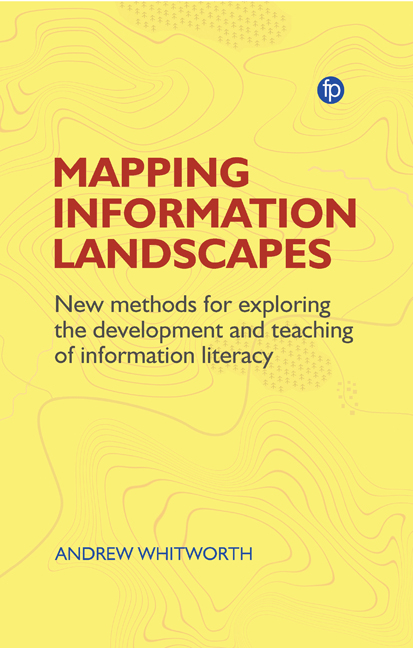 Mapping Information Landscapes
Mapping Information Landscapes Book contents
3 - Mapping and Power
Published online by Cambridge University Press: 23 July 2020
Summary
Introduction
Mapping as a practice is wholly intertwined with conceptions of power, the ability to impose one's practices and perspectives on the world and on others. An argument in favour of this stance is constructed, in detail, by David Harvey in his book Justice, Nature and the Geography of Difference (1996), and this chapter's argument is significantly based on that work. In addition, Harvey offers the important notion of discursive mapping, an essential foundation for the chapters to follow. The discussion in Chapter 2 hinted at the idea that mapping processes can be occurring without an image, or cartograph, actually being produced (as with, for example, the rutter). Understanding this distinction is essential for appreciating how mapping – not just maps as a product, but the processes of dialogue, abstraction, organisation, representation and communication that create them – fundamentally shapes the information practices within social settings and is thus a locus of power.
What is being created through such processes are not just maps in the graphic sense – the Hereford Mappa Mundi, MOLA, etc. – but cognitive schema. Schema are ways in which we organise the knowledge in our minds and are thus part of the background against which we make judgements about information selection and the media of dissemination; they are learned, stored ways of thinking and:
… function to pick out relevant, ‘schema-consistent’ data from the rush of information we regularly confront. As such, they are pre-existing selection criteria that manage cognitive overload and enhance the capacity to solve problems.
(Blaug, 2007, 30)In other words, schema are substructures of the collective matrix of interpretation (ibid., passim). Schema – and the mapping processes from which they emerge and which help define their form – act as media through which power can be used to impose information practices on subordinate groups and the information landscapes they steward. But the same processes can also be used by communities to better understand and organise their own landscape, share information about how that landscape can be nurtured for the collective benefit of the community which inhabits it, and ultimately, distribute authority over it, and the associated information practices, among members of the group.
- Type
- Chapter
- Information
- Mapping Information LandscapesNew Methods for Exploring the Development and Teaching of Information Literacy, pp. 51 - 66Publisher: FacetPrint publication year: 2020


